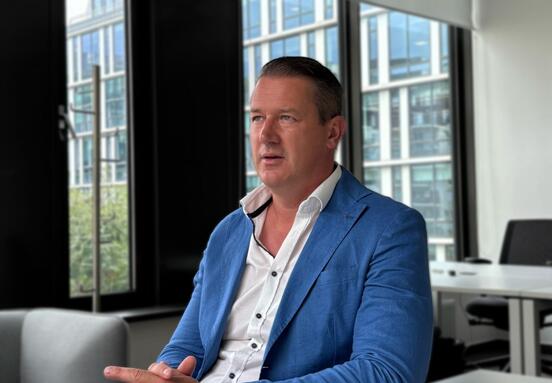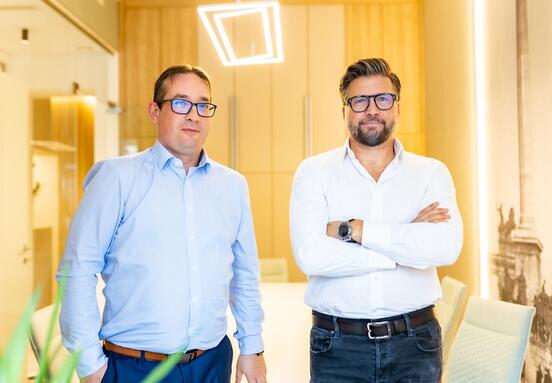2025 will be the year when winners are separated from losers! We also discussed the role of ESG, the life-threatening nature of the copy+paste model and whether the interests of landlords and tenants can be aligned.
- The current geopolitical and economic situation impacts all asset classes, but especially offices, which face a few more challenges. Do you see a chance of recovery by 2025?
- Some may think that with the decrease in interest rates and slightly positive signs from the construction industry, we are through the cycle and will see a turnaround in the office market, but this will not happen soon.
- Your companies are active throughout the region. How similar are the Central European markets?
- The CEE markets are quite different. For example, we witnessed a 22% increase in leasing activities in Prague while Bucharest saw a 27% reduction in 2024. Colliers, Poland reports, "The vacancy rate for office space in 9 largest markets in Poland increased to 14.5%", while at the same time, CBRE Budapest reported ", All submarkets except CBD and Periphery have higher vacancy rates at the end of H1 2024. As the Periphery (33.2%), Central Pest (18.0%), Non-Central Pest (17.7%), and South Buda (14.9%)." In Budapest, there are 650,000 sqm of office space under construction, which of 60% has been pre-leased by the public sector with delivery by 2026. Thus, the net space coming on is quite low, but without the stimulation from the public sector, there would have been almost no leasing activity at all, and the reported vacancy would be much higher. Customers generally require flexible solutions and 'space as a service' rather than office space on fixed terms and inflexible conditions in uncertain times. Thus, the situation favours flexible office space operators like New Work.
- You mean that the emergence of hybrid work was only the start of a series of events that would significantly impact the office industry?
- The industry is undergoing significant shifts, starting with the pandemic that led to a hybrid work lifestyle. This shift, depending on the sector, has resulted in a reduced need for office space by 20-30 %. Now, the rise of new technologies, particularly AI or Chat GPT, is having a similar impact on the office industry. While the impact driven by ESG criteria is yet unknown, it is to be expected to be significant. Hence landlords need to adapt their strategies since we witness "a strategic inflection point". The industry is shifting to an area we haven't experienced. It appeared when Nokia decided not to follow the smartphone trend. We know what happened and should consider what happens in the world today. The proper perspective is crucial for survival. As Steve Jobs said, "If you want to understand your product, you need to develop it from the customer backwards. "
- How important are the ESG rules? I ask you to shed light on the impact on day-to-day business!
- ESG principles and sustainability play a crucial role in New Work's strategy! Offices aren't the main place of work anymore. But at New Work, we say, "If you want to work, stay at home; if you want to get the job done, go to the office." This means that for tasks like reading and writing emails, there's no reason to spend one or two hours commuting anymore. However, customers only experience aspects like serendipity, socialising, and collaboration when they come into the office. As a result, the workplace model is shifting in terms of desk-share ratios and how we offer space. New Work's 'space as a service' concept includes flexible terms and conditions, 360° reception and concierge services, procurement management, catering, business mixers, social events, and more. We even encourage our customers to bring their dogs to work with them. In this way, they can feel how different it is to work from home and see the office as the place to be! For me, this is the core of creating an upgraded social experience for customers, in addition to creating an eco-friendly and energy-efficient office space!
- It’s sound like ESG is in your DNA.
- With workcloud24, we launched an ESG monitoring platform in 2019 when a few others had ESG on their radar. Thanks to this, New Work is leading the industry regarding ESG standards and qualities, which are becoming increasingly important for tenants and landlords. At the same time, we know that we will not need as much office space in the future as we did in the past, and customers prioritise buildings with high-quality features. Hence, the main challenge is to activate the existing office stock of B-class buildings, which for Budapest is well above 2 million sqm. As those assets struggle to meet ESG standards and attract tenants, Landlords must create innovative ideas to repurpose and modernise B-class buildings to meet market demands.
- As I understand it, aligning the interests of the landlord and the office operator is the key to success.
- At New Work, we've shifted from tenants to "partners in crime" with landlords to activate office space. This collaboration aligns the interests of office operators and landlords, creating a noticeable difference in value perception - something customers can feel immediately. Analysis from New Work shows that landlords should consider operational models similar to shopping malls, where profit is generated from turnover rent and a centralised management approach to activate office space in the future. We can copy-paste what we see today in the centre management in shopping malls where the profit of the asset is not generated by the anchor tenant and the long-term leases but by the turnover rent from frequent customers. Unless this doesn't happen, we are unprepared for the coming times!
- But you do. Does the disruption of the traditional office concept support New Work's long-term growth plans?
- After the lockdowns, New Work entered a period of consolidation. Since 2024, we have resumed our growth trajectory, opening new centres all within the new operational model. We have started with a new location in Warsaw, and for 2025, we plan to open a few more new centres, one in Budapest and two in Warsaw. Additionally, we will enter the German market in Berlin, which offers significant opportunities for future growth. We aim to add 30 new locations over the next five years.
Irodakereso.info











